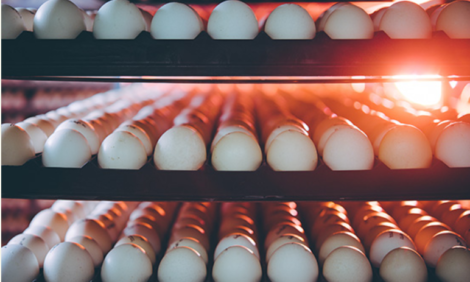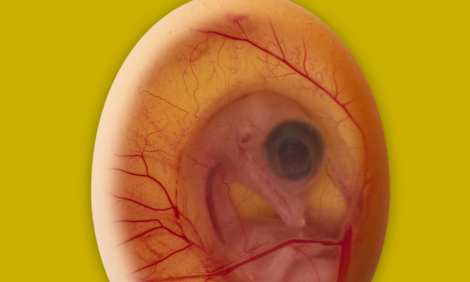



Moves to Increase Welfare in Non-stun Slaughter
UK - The British government is to look at ways of introducing post-cut stunning in religious slaughter systems.In a debate in the House of Commons this week, the farming minister George Eustice said that the government has no plans to ban religious slaughter practices.
However, he said that the Government could look at systems that have been introduced in other countries to increase the welfare of animals in non-stun slaughter methods.
“The Prime Minister has been absolutely clear that there is no intention to ban religious slaughter,” said Mr Eustice.
“However, everyone agrees that we need good enforcement of our existing legislation.”
He added: “In the longer term, we may be able to learn lessons from other countries. Some other countries have managed to accommodate or reconcile the beliefs of Jewish and Muslim communities while having a slightly different approach from us.
“A number of countries, including Holland and France, do have a requirement for a post-cut stun in a particular time scale.
“It is not easy to get consensus among the religious communities for that, but we should also recognise, as I said at the beginning, that in many respects our national rules are better than those elsewhere in Europe, especially on the issue of inversion, which is, according to all advice, quite serious.”
During the debate, which had been called following the presentation of an e-petition that gathered more than 100,000 names urging a debate on non-stun slaughter practices, Mr Eustice said that the Food Standards Agency is now carrying out a series of unannounced inspections of slaughterhouses following the reports of several incident of mistreatment of animals and bad practices.
“Following a number of incidents, the FSA has begun a series of unannounced inspections of GB slaughterhouses, and by the end of March all approved slaughterhouses will have been subject to an unannounced inspection,” said Mr Eustice.
The petition called for an end to slaughter without pre-stunning for all animals.
It said that EU and UK law requires all animals to be pre-stunned before slaughter to render them insensible to pain until death supervenes. But non-stun slaughter is permitted for certain communities.
“We support BVA, RSPCA, HSA, FAWC and FVE who conclude that scientific evidence shows that non-stun slaughter allows animals to perceive pain and compromises welfare,” the petition motion said.
“We must differentiate between religious and non-stun slaughter. Our concern does not relate to religious belief but to the animal welfare compromise of non-stun slaughter.
“We note: over 80 per cent of UK Halal slaughter is pre-stunned hindquarters of animals killed by (non-stun) Shechita can enter the market unlabelled.
“While non-stun slaughter is permitted, we call for clearer slaughter-method labelling and post-cut stunning to improve welfare.
“Non-stun slaughter affects millions of animals. We support a good life and a humane death for all animals.”
In summing up the debate, Philip Hollobone, who opened the debate said: “Labelling is a key issue.
“The extent of mis-stunning has shocked us all.
“I have not heard anyone speak out against CCTV in all slaughterhouses, and a very strong case was made for post-cut stunning.
“I hope the Minister has been impressed by the strength and variety of contributions made to him. I am sure that he will stick to his commitment to look at these issues in greater detail, because the public out there want Parliament —our Parliament—to do something about this.”
Following the debate, the British Veterinary Association president John Blackwell said: “The Parliamentary debate on the subject of non-stun slaughter was well attended by MPs of all parties. MPs were considered and thoughtful in the way they consistently emphasised the welfare compromise of animals slaughtered without pre-stunning.
“It is now clear that the Government can no longer ignore the strength of feeling of MPs and the public on this issue.
“While the Government clearly agrees with the scientific evidence that slaughter without pre-stunning allows animals to feel pain and compromises animal welfare, it has yet to take any action to reduce the suffering of the animals involved.
“This delay to act in the face of overwhelming evidence is completely unacceptable.
“Many MPs of all parties at the debate agreed with BVA that if the Government continues to allow non-stun slaughter to continue then it must introduce clearer slaughter method labelling.
“While we know that more than 80 per cent of Halal is pre-stunned, there is already more non-slaughter in percentage terms than the size of the Muslim and Jewish populations in the UK.
“This means that some of it must be going outside of the communities for which it was intended. Clearer labelling will not only give consumers a choice but will help ensure the number of animals slaughtered is limited to satisfy the needs of the religious communities concerned and thereby reduce the amount of non-stun slaughter.
“MPs at the debate were also keen for the Government to consider measures that would better control volumes of meat required by religious communities.
“MPs highlighted the practice in Germany, where abattoirs have to prove the ‘religious’ needs and define the number of animals to be slaughtered for the communities concerned before being granted a licence.
“MPs also raised the option of introducing an immediate post-cut stun in order to reduce the suffering and pain of animals not stunned before slaughter.
“The BVA and our members have worked hard to push the issue of non-stun slaughter up the political agenda.
“As a result, there has never been more pressure on the Government to take action and improve the welfare of animals slaughtered without pre-stunning.
“Whether the Government will end non-stun completely or introduce measures to reduce the amount of animals slaughtered using this method, one thing is very clear, inaction is now no longer a credible option.”








